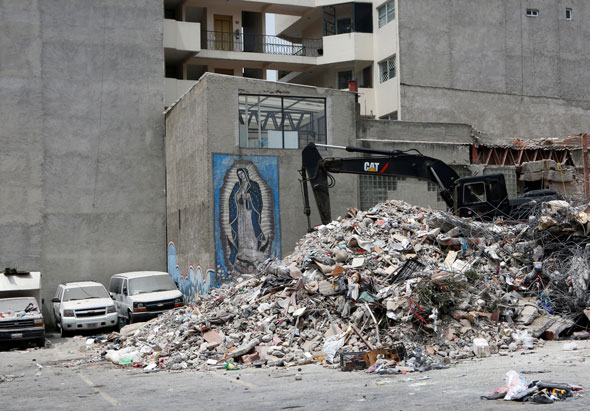
My dear brothers and sisters in the Lord,
The recent multiplicity of natural disasters, with Hurricanes Harvey, Irma and Maria, and the earthquake in Mexico, have all come in less than a month’s time. These tragic events certainly lead us to consider why natural disasters occur.
Today with the advanced methods of predicting weather and even seismological advances we know in advance that these events may happen. Still, we never seem to be prepared when they arrive. For many, natural disasters are part of the problem of evil that mankind has struggled to understand from our very beginnings.
Drawing on ancient wisdom, the problem of evil was described by a pagan philosopher named Epicurus in about 300 B.C. It is a famous paradox titled, “The Riddle of Epicurus” that describes how natural religion tries to deal with the problem of evil. The riddle says, “If God is willing to prevent evil, but is not able to, then He is not omnipotent. If He is able, but not willing, then He is malevolent. If He is both able and willing, then whence cometh evil? If He is neither able nor willing, then why call Him God?”
Unfortunately, natural religion somehow sees God as the source of evil and natural disasters, since God, being all-powerful, does not stop these events from happening. Many in our world today still live at the level of natural religion. Some say this: “If we are good then God will reward us; if I am good then God will prevent nature from turning against me and natural disasters from harming me.”
We cannot see the problem of evil, however, as one that has God as its origin. We fail to remember that creation, as it came from the hand of God as recounted to us in the Book of Genesis, was a place of peace and tranquility. It is only after humankind rebelled against God that even nature rebels against humankind. But we continually try to attribute to God and not ourselves the unruliness of nature itself.
The recent debate about global warming is truly an interesting one. In many ways, we wonder if man is the cause of global warming which needs to be verified scientifically. I am always amazed by those who pose the question, “Do you believe in global warming?” It certainly is not something to believe in. Global warming is something to be demonstrated by science. It seems well-proven that the polar ice caps are melting, and that there is a hole in the ozone. Tropical storms are a normal occurrence, but the warming of our oceans may be what gives them added strength. My understanding of global warming stops there.
A wonderful book co-authored by our former Mayor, Michael Bloomberg, and Carl Pope entitled, “The Climate of Hope: How Cities, Businesses and Citizens Can Save the Planet,” can give you a very understandable analogy of what science knows about climate change.
I do believe that Our Holy Father, Pope Francis, has challenged the world, in his encyclical “Laudato Si’,” to cooperate in making our world a better place by doing our part not to harm the environment. He stated, “On many concrete questions, the Church has no reason to offer a definitive opinion; she knows that honest debate must be encouraged among experts, while respecting divergent views. But we need only take a frank look at the facts to see that our common home is falling into serious disrepair.”
Certainly, it is debatable what the best ways are for us to ameliorate the environment in which we live. But the Holy Father’s concept of “integral ecology” is well worth studying as a pathway for believers to assist in this crisis.
The scenes of the destruction caused by the recent hurricanes and earthquake are truly heartrending. All we can do is pray and offer our assistance to those in dire need. The Diocese of Brooklyn already announced two special collections and another to follow soon for victims of Hurricane Maria, as well as one to assist with the disaster of the earthquake in Mexico.
Four special collections in such a short time are not something that we normally experience. Neither, however, have we experienced so many natural disasters is such a short period of time. I am certain that the generosity of the people of Brooklyn and Queens will never be outdone by the number of requests that are made of them for such disasters.
The greatest stimulus for giving is seeing the destruction caused by these natural disasters. Again, however, we can never blame God for these events or think that God is angry with us because these natural disasters occur. We live in a world gone awry through sin. This has also affected the stability of the natural world that surrounds us. Our response must always be one of charity and renewed understanding of our relationship to God.
Whenever we confront evil, be it natural or moral, and try to understand it, we are putting out into the deep because it is so difficult with our limited human understanding to dissect a problem that is so rooted in our human nature. We are blinded to the correct understanding of evil. It is only the light of faith that can bring us to understand that Christ is the Light of the World and that His suffering has given meaning to all human suffering. This also helps us to understand that God does not cause evil, but permits it as it afflicts our human nature touched by Original Sin but redeemed by Jesus Christ.
